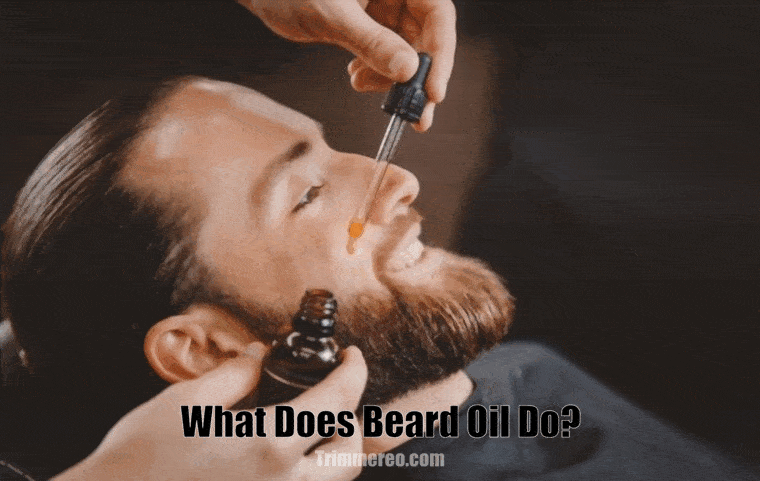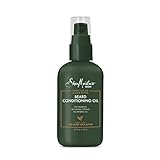Beard oil has become increasingly popular among men as they recognize the importance of proper beard care and maintenance. In this article, we will explore the benefits and functions of beard oil, shedding light on why it has become a staple in many grooming routines.
Today, we have delved deep into the research, conducted fact checks, and crafted our article to shed light on the wonders of beard oil.
Beard oil is an essential grooming product that every bearded gentleman should possess and incorporate into their routine. By using beard oil on a daily basis, you can achieve a soft, smooth, and lustrous beard. This remarkable transformation is primarily attributed to two key ingredients: carrier oils and essential oils.
The combination of carrier oils and essential oils in beard oil works wonders in combating beardruff (dandruff in the beard) and alleviating beard itch. Additionally, these oils help restore the lost moisture of your facial hair, revitalizing it in the process.
If you’re curious to learn more about the specific ingredients found in carrier and essential oils, we invite you to continue reading this article.
Understanding Beard Oil
Beard oil is a specially formulated grooming product designed to nourish, condition, and enhance the appearance of facial hair, particularly beards. It typically consists of a blend of carrier oils and essential oils.
Carrier oils, such as jojoba oil, argan oil, coconut oil, or grapeseed oil, form the base of beard oil. These oils are rich in vitamins, minerals, and fatty acids that provide deep hydration to the beard and the underlying skin. Carrier oils help moisturize the facial hair, making it softer, more manageable, and less prone to breakage.
Essential oils, on the other hand, are added to beard oil for their aromatic and therapeutic properties. They provide fragrance to the beard oil and offer various benefits to the skin and hair.
Some common essential oils used in beard oil include cedarwood, sandalwood, tea tree, peppermint, and lavender. These oils can have soothing, antibacterial, and anti-inflammatory effects, promoting a healthier beard and skin.
When applied to the beard, beard oil helps to hydrate and moisturize both the facial hair and the skin underneath, reducing dryness, itchiness, and flakes (beardruff).
It also helps to soften coarse beard hairs, making them more manageable and less prone to tangling. Additionally, beard oil can give your beard a healthy shine and a pleasant scent.
Purpose of Beard Oil and Benefits
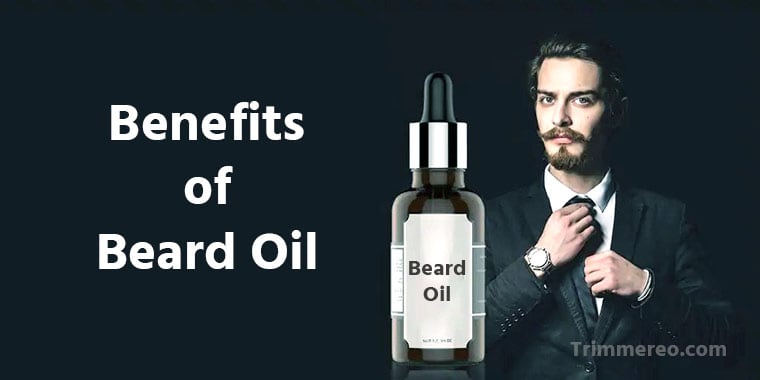
One of our team members has listed down four core benefits of beard oil that every bearded guy should acknowledge. But does beard oil work? Yes, it does! Continue reading to know the why-
Moisturizing and Hydrating the Beard
One of the primary functions of beard oil is to moisturize and hydrate your facial hair. The natural oils in beard oil penetrate the hair shaft, preventing dryness, itchiness, and flakiness. The result is a softer, healthier beard that looks and feels great.
- Key oils for moisturizing:
- Argan oil
- Jojoba oil
Softening and Smoothing the Beard
Beard oil also helps in softening and smoothing your beard hair, making it more manageable and reducing tangling. By using beard oil regularly, you can enjoy a beard that feels luxuriously soft and looks well-groomed.
- Key oils for softening:
- Almond oil
- Coconut oil
Promoting Healthy Beard Growth
If you’re aiming for a fuller, healthier beard, beard oil can be your ally. Certain essential oils found in beard oil, such as cedarwood oil and peppermint oil, have properties that stimulate hair follicles, promoting healthy beard growth.
- Key oils for growth:
- Cedarwood oil
- Peppermint oil
Preventing Beard Itch and Irritation
Many men experience beard itch and irritation, especially during the early stages of growing a beard. Beard oil can help alleviate these discomforts by moisturizing the underlying skin and reducing dryness.
- Tips for reducing itch:
- Apply beard oil after cleansing and drying your beard.
- Massage the oil into the skin to soothe irritation.
Conditioning and Nourishing the Skin
In addition to benefiting your beard, beard oil also conditions and nourishes the skin beneath. This is crucial for maintaining a healthy environment for beard growth and preventing common issues like dry or flaky skin.
Providing a Subtle Fragrance
Beard oil often contains essential oils that add a subtle fragrance to your beard. These scents not only enhance your grooming experience but also have mood-boosting effects.
Choose a fragrance that aligns with your personal style and preferences.
- Popular scents:
- Sandalwood
- Citrus
- Cedar
Beard Oil Ingredients
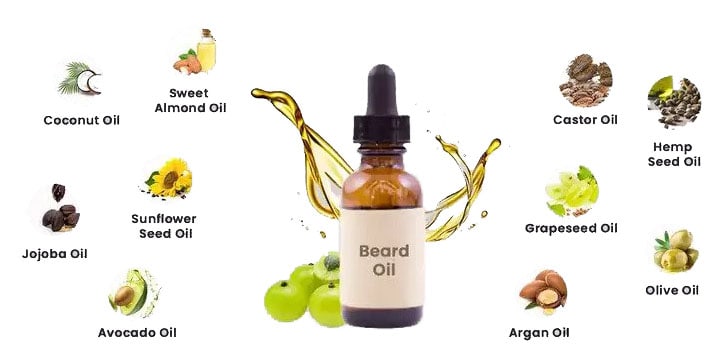
Ingredients are the first thing we took into consideration as it is the pillar of beard oils. Most of the beard oils consist of carrier oils and essential oils. Whereas some high-quality beard oil brands even add Vitamin E to deliver essential vitamins to facial hair and skin beneath it.
Carrier Oils: Nourishing and Moisturizing
- Jojoba Oil: This versatile oil closely resembles the natural oils produced by the skin, making it an excellent moisturizer and conditioner. Jojoba oil softens the beard, reduces dryness and flakiness, and promotes healthy hair growth.
- Argan Oil: Extracted from the kernels of the argan tree, argan oil is rich in antioxidants and vitamin E. It moisturizes and hydrates the beard, adds shine, and helps prevent split ends. Argan oil also nourishes the skin, promoting overall beard health.
- Sweet Almond Oil: With its lightweight texture and high vitamin content, sweet almond oil moisturizes the beard without leaving a greasy residue. It strengthens the hair, reduces breakage, and soothes dry, itchy skin.
- Coconut Oil: Known for its nourishing properties, coconut oil provides deep hydration to both the hair and skin. It helps soften the beard, reduces protein loss, and protects against environmental damage.
- Grapeseed Oil: Derived from grape seeds, this light and non-greasy oil are rich in antioxidants and vitamin E. Grapeseed oil moisturizes the beard, promotes hair growth, and has antimicrobial properties that help prevent skin issues.
- Castor Oil: Famous for its thick consistency, castor oil is a popular choice for beard growth. It strengthens the hair follicles, reduces breakage, and encourages thicker, fuller beard growth.
- Avocado Oil: Packed with essential fatty acids and vitamins, avocado oil deeply nourishes and moisturizes the beard. It helps repair damaged hair, prevents dryness, and soothes irritated skin.
Essential Oils: Fragrance and Therapeutic Benefits
- Cedarwood Oil: Known for its warm and woodsy scent, cedarwood oil promotes beard growth by improving blood circulation to the hair follicles. It has antibacterial properties that keep the beard clean and free from skin infections.
- Peppermint Oil: The invigorating scent of peppermint oil adds a refreshing touch to beard oil. It stimulates blood flow to the hair follicles, promoting healthy growth, and provides a cooling sensation to the skin, relieving itchiness.
- Sandalwood Oil: With its distinctive woody aroma, sandalwood oil has a calming effect on the mind and body. It soothes irritated skin, reduces inflammation, and adds a pleasant fragrance to your beard.
- Tea Tree Oil: Known for its antibacterial and antifungal properties, tea tree oil helps keep the beard clean and healthy. It combats beardruff, prevents acne, and reduces itchiness and inflammation.
- Lavender Oil: Renowned for its soothing and relaxing scent, lavender oil promotes a sense of calm. It has antimicrobial properties that keep the beard fresh and clean, and it also helps balance natural oils in the skin.
- Eucalyptus Oil: The invigorating aroma of eucalyptus oil rejuvenates the senses. It has antiseptic properties that cleanse the beard and skin, promoting a healthy and itch-free environment.
- Citrus Oils (such as lemon, orange, and grapefruit): These bright and uplifting oils add a pleasant citrusy scent to beard oil. Citrus oils have antibacterial properties that help cleanse the beard and promote a fresh feeling. They also have a mood-boosting effect, energizing both the beard and the mind.
- Patchouli Oil: With its earthy and musky aroma, patchouli oil adds a unique scent to beard oil blends. It has antimicrobial properties that keep the beard clean and fresh while providing a grounding and relaxing effect.
- Rosemary Oil: Known for its stimulating properties, rosemary oil promotes beard growth by improving circulation to the hair follicles. It also has antioxidant properties that help prevent damage to the hair and skin.
- Ylang-Ylang Oil: Ylang-ylang oil offers a sweet and floral fragrance to beard oil. It has soothing properties that help calm the skin and balance oil production, leaving the beard and skin feeling nourished and refreshed.
- Frankincense Oil: With its warm and resinous aroma, frankincense oil adds depth to the fragrance of beard oil. It has anti-inflammatory properties that soothe the skin and promote a healthy environment for beard growth.
- Rosehip Oil: Extracted from the seeds of wild rose bushes, rosehip oil is rich in vitamins and essential fatty acids. It moisturizes the beard, improves skin elasticity, and helps repair damaged hair follicles.
By understanding the unique benefits of each carrier oil and essential oil, you can select beard oils that cater to your specific needs and preferences. Experiment with different combinations to find the perfect blend that nourishes your beard, promotes healthy growth, and leaves you with a delightful fragrance.
Side Effects Of Beard Oil: Ingredients to Avoid
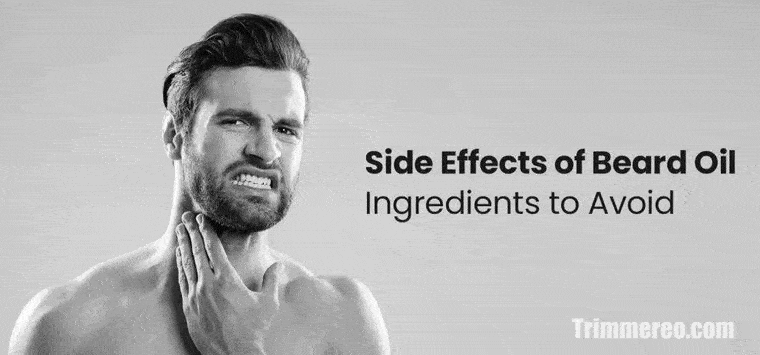
While beard oil is generally safe to use and provides numerous benefits, it’s essential to be mindful of certain ingredients that may cause adverse reactions or have potential side effects.
To ensure the health and well-being of your beard and skin, it’s advisable to avoid the following ingredients in beard oils:
- Synthetic Fragrances: Artificial fragrances often contain chemicals that can irritate the skin, leading to redness, itching, or allergic reactions. Opt for beard oils with natural essential oils for a safer and more pleasant fragrance experience.
- Mineral Oil: Derived from petroleum, mineral oil is a common ingredient in some cheaper beard oils. However, it can clog the pores, leading to breakouts or acne. Look for oils that use natural carrier oils instead.
- Silicones: Silicones like dimethicone are used in some grooming products, including beard oils, for their smoothing and softening effects. However, they can create a barrier on the hair and skin, preventing moisture from being absorbed and potentially causing dryness and damage in the long run.
- Alcohol: Some beard oils contain alcohol, which can be drying to the hair and skin. It strips away natural oils, leading to dryness, flakiness, and potential damage. Look for alcohol-free options or those that use natural alternatives like witch hazel.
- Parabens: Parabens are preservatives commonly used in cosmetic products. However, they have been linked to hormone disruption and skin irritation. Opt for beard oils that are paraben-free or use natural preservatives.
- Phthalates: Phthalates are chemicals often found in synthetic fragrances and may have adverse effects on hormone balance. They can be irritating to the skin and potentially harmful. Choose beard oils that are phthalate-free or use natural fragrances.
- Sulfates: Sulfates, such as sodium lauryl sulfate (SLS) and sodium laureth sulfate (SLES), are harsh cleansing agents that can strip away natural oils and cause dryness. They are typically found in shampoos but may be present in beard oils with cleansing properties. Opt for sulfate-free options.
By avoiding these potentially harmful ingredients and opting for natural, high-quality beard oils, you can minimize the risk of side effects and maintain the health and appearance of your beard and skin.
It’s crucial to read product labels, do your research, and choose beard oils that are tailored to your specific needs and free from potentially problematic ingredients.
How to Apply Beard Oil
To get the most out of your beard oil, follow these steps for effective application:
- Cleanse and dry your beard.
- Dispense a small amount of beard oil into the palm of your hand.
- Rub your hands together to distribute the oil evenly.
- Massage the oil into your beard and underlying skin.
- Use a beard comb or brush to evenly distribute the oil throughout your beard.
- Tip: Adjust the amount of beard oil based on your beard length and personal preference.
Best Beard Oils Available
FAQs
Q1: What is beard oil, and why should I use it?
A1: Beard oil is a grooming product made from a blend of carrier oils and essential oils. It provides hydration, nourishment, and conditioning to your beard and the underlying skin.
Using beard oil helps combat dryness, itchiness, and beardruff while promoting a healthier, softer, and more manageable beard.
Q2: How often should I apply beard oil?
A2: The frequency of applying beard oil depends on various factors such as the length and thickness of your beard, as well as personal preference.
As a general guideline, it is recommended to apply beard oil once or twice daily. However, you can adjust the frequency based on your beard’s needs and how it responds to the oil.
Q3: How do I apply beard oil correctly?
A3: To apply beard oil, follow these steps:
- Start with a clean, towel-dried beard.
- Dispense a few drops of beard oil into your palm.
- Rub your hands together to distribute the oil evenly.
- Gently massage the oil into your beard, making sure to reach the roots and skin beneath.
- Use a beard comb or brush to distribute the oil and style your beard as desired.
Q4: Can beard oil help with beard growth?
A4: While beard oil cannot directly stimulate beard growth, it provides a healthy environment for optimal growth. The nourishing properties of carrier oils and the circulation-boosting effects of some essential oils can promote healthier hair follicles and reduce breakage, allowing your beard to grow to its full potential.
Q5: Can I use beard oil on a short beard?
A5: Absolutely! Beard oil is beneficial for all beard lengths, including shorter ones. Even if your beard is just starting to grow, using beard oil will help keep the hair and skin moisturized, reducing itchiness and promoting healthier growth from the beginning.
Q6: Will beard oil make my beard greasy?
A6: When used in the right amount, beard oil should not leave your beard feeling greasy. It is important to use only a few drops and distribute it evenly through your beard. Start with a small amount and add more if needed, finding the balance that works best for your beard and skin.
Q7: Can I make my own beard oil at home?
A7: Yes, making your own beard oil is possible. However, it requires careful selection and proper blending of carrier oils and essential oils. Ensure you research the ingredients, their benefits, and appropriate dilution ratios.
DIY beard oil recipes can be a fun and cost-effective way to customize your grooming routine, but be mindful of using high-quality ingredients and maintaining proper hygiene during the preparation process.
Q8: Can I use beard oil on a mustache?
A8: Absolutely! Beard oil can be used on a mustache as well. Apply a small amount of beard oil to your fingertips, then gently work it into your mustache, making sure to reach the skin beneath. This helps moisturize and soften the mustache hairs, making them more manageable and enhancing overall appearance.
Conclusion
Beard oil plays a crucial role in maintaining a healthy, well-groomed beard. Its moisturizing and hydrating properties prevent dryness and itchiness, while its softening effects make the beard more manageable.
By promoting healthy beard growth and nourishing the skin, beard oil enhances the overall appearance and feel of your beard. Remember to choose a high-quality, natural beard oil and follow proper application techniques for optimal results.
Enjoy the benefits of a well-cared-for beard and rock your signature style with confidence.

Hey. I’m Bradley, the founder and editor of Trimmereo. I independently buy and test trimmers; electric shavers and I’ve been sharing my findings on this site for more than 8 years, hopefully helping others choose the right shaver.
If you found the information useful, consider subscribing to the Trimmereo newsletter as well. It’s free and I only send a few emails per month. Unsubscribe at any time.

